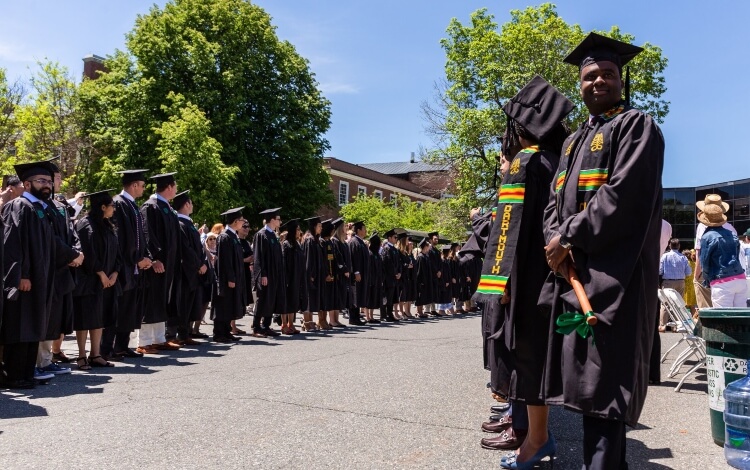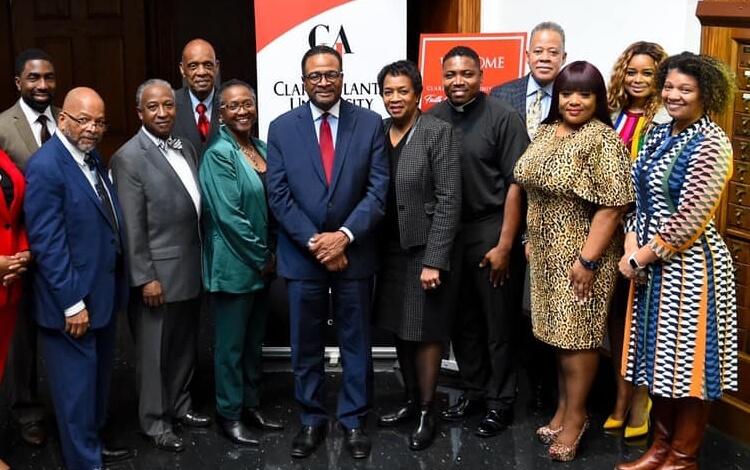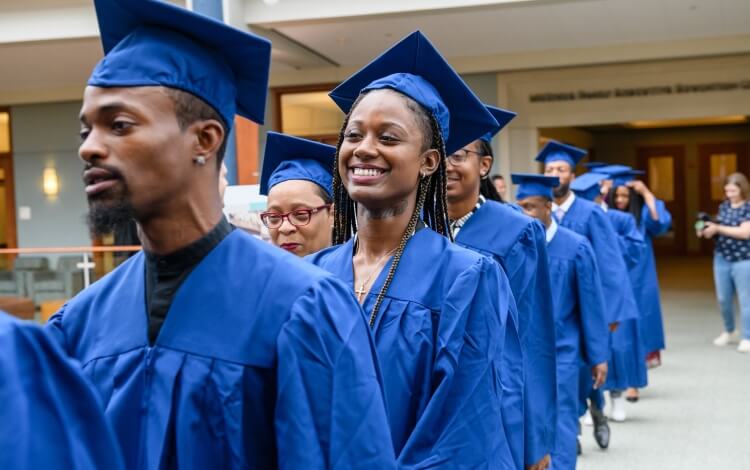African Americans are severely underrepresented at business schools across the United States.
Of all US-origin GMAT examinees, less than 10% are African-American. The knock-on effect of that is that industry suffers further down the pipeline—a trickle of African-American MBA graduates account for just 4% of executive and senior-level positions within private industry.
A number of organizations, institutions, and individuals have committed to working against this widely-recognized uniformity in business schools, and the marketplace that absorbs the MBAs they produce.
Here are five of the best US business schools for African-American MBAs:
1. Howard University School of Business

Students at Howard University School of Business take a retreat to Martha's Vineyard © Howard University via Facebook
Historically Black College (HBCU) Howard University in Washington DC has retained its traditionally high African-American student population and has consequently developed a reputation for producing graduates with strong leadership skills.
Founded in 1970, its school of business is also regarded as among the foremost American MBA programs, offering enviable amenities and curricular options. It's one of only a few schools in the country to boast a Financial Markets Trading Room simulation.
It also offers considerable flexibility with part-time programs, and a cross-section of dual degrees permitting one to pair their MBA with a JD, MD, or a degree in pharmacy, engineering, or computer science.
The innovative Global Trilateral MBA program is a collaboration between Howard, Central University of Finance and Economics, Beijing, and Gordon Institute of Business Science at the University of Pretoria in South Africa. It provides participants with an unparalleled global vantage point.
Coursework is aimed at cultivating an understanding of global cultures within business, and it is bolstered by international tours and worldwide consulting placements. Of additional relevance, Howard has a vast and expanding alumni network, a valuable resource with almost 7000 members offering professional insights and opportunities.
2. Dartmouth's Tuck School of Business

Dartmouth University Tuck School of Business graduation ceremony. © Tuck School of Business via Facebook
In many cases, applying to a particular school hinges upon a particular faculty member. Tuck is a widely-recognized, highly-ranked institution already, but the work of Dr Ella LJ Bell Smith may indeed provide additional incentive to investigate Tuck.
Ella's extensive CV includes prior posts at Belk College of Business Administration, the University of North Carolina at Charlotte, MIT Sloan School of Management, Massachusetts Institute of Technology, Yale's School of Management, and the University of Massachusetts at Amherst.
She also co-authored the 2001 book Our Separate Ways: Black and White Women and the Struggle for Professional Identity, which drew on an exhaustive study of 825 black and white female managers and zeroed in on the stories of seven black and seven white female executives at some of the most prestigious companies in America to discuss the intersection of gender and race.
She's also worked extensively as consultant for a number of Fortune 500 companies.
This cumulative insight informs the outlook of her pedagogy, which includes courses such as Leadership out of the Box, and Personal Leadership.
3. Hough Graduate School of Business at the University of Florida – Warrington College

Students at Hough University's Graduate School of Business. © Hough University via Facebook
This top-rated business school has been working to build a number of meaningful diversity-oriented initiatives aimed at broadening the make-up of the school—and, by extension, the workforce.
One of the most important initiatives for prospective African-American students is Hough's partnership with the National Black MBA Association (NBMBAA), which has resulted in a full scholarship program for graduate students.
4. Clark Atlanta University

Staff & faculty at Clark Atlanta University © Clark Atlanta University via Facebook
Clark Atlanta may not offer the prestige of other top-tier schools on the list, but the intimate numbers and reasonably-priced tuition of its MBA program certainly make it an attractive option.
The 11:1 student-to-faculty ratio ensures individually tailored learning and plenty of opportunity for direct guidance for students. In addition to its remarkable ethnic diversity, its population is overwhelming female, which, given typical MBA standards for gender diversity, makes it stand out.
5. Georgetown's McDonough School of Business

Graduation ceremony at Georgetown McDonough School of Business. © McDonough School of Business via Facebook
In addition to being an NBMBAA partner school, McDonough is also a member of the Consortium for Graduate Study in Management.
Formed in 1966 with the aim of giving African-Americans the business skills needed to secure positions in corporations, the Consortium has persevered, evolving into one of the country's most notable diversity-geared organizations.
The combined efforts of the NBMBAA and Consortium mean that McDonough offers an array of different merit-based full and partial scholarships that take into account the professional, academic, and personal histories of the applicants.
Next read:
Can Business Schools Do More To Support The Black Community?
Resources For Black Business School Candidates
This article was first published in May 2018 and updated in July 2020


